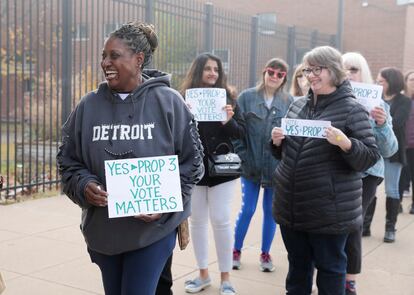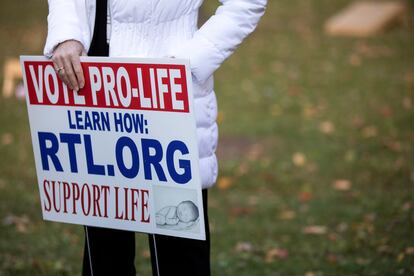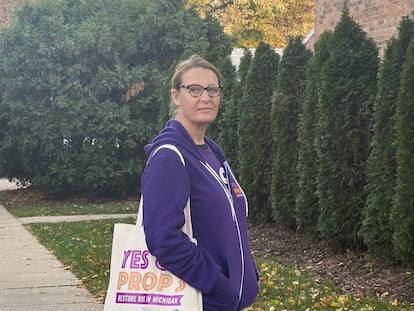Michigan: The testing ground for the future of abortion in the United States
A referendum in the state as part of the midterm legislative elections will decide whether Proposition 3, a text that protects the right to decide, will block the entry into force of a 1931 law prohibiting terminations completely


Loren Khogali was pacing around a criminally quiet suburb of Plymouth, half an hour from Detroit, last Sunday. “Yes to Prop 3. Restore Roe in Michigan,” a slogan on her purple sweatshirt read. Armed with a stack of brochures and a cellphone to check the addresses of registered voters so she knew which doors to knock on, she navigated piles of dry leaves from one Halloween-decked single-family home to the next. She tried her luck with Democrats and Republicans alike. Homes with no voting history were discarded, as were houses with anti-abortion posters on the porch or in the garden. “I prefer not to waste time that I could spend with an undecided voter,” she explains. “The first thing is to make sure that they plan to vote and that they understand what is at stake, and then give them the necessary information. Sometimes interesting exchanges of views take place.” After a brief conversation with every resident who answered the door, the activist deposited a flyer in the shape of a hotel “Do Not Disturb” notice and continued on her way.
Khogali is executive director of the American Civil Liberties Union (ACLU) in Michigan. Along with Planned Parenthood Advocates of Michigan (PPAM), an arm of America’s leading reproductive health care provider, the ACLU is one of the progressive partner organizations in the Reproductive Freedom for All coalition. They advocate Proposition 3, which promotes an amendment to the State Constitution to protect the right to decide, among other issues. If successful at the polls on November 8, when the referendum is voted on along with political offices from governor to attorney general in the hotly contested legislative elections, it would block a 1931 law from going into effect that completely prohibits abortion, including in cases of incest, rape and threats to the mother’s health – the law only allows for intervention if the pregnant woman’s life is in danger.

The proposal seeks to guarantee that “every person” can enjoy their “fundamental right to reproductive freedom.” That includes safeguarding abortion, and also the freedom to choose prenatal care, childbirth, postpartum care, contraception, sterilization and infertility treatments. It also empowers legislators to prohibit or regulate the termination of pregnancy after the viability of the fetus, but prevents them from pursuing any abortion that a physician deems necessary to “protect the life or physical or mental health” of the pregnant woman beyond that limit (such cases occur in 0.2% of pregnancies, according to medical associations).
Opponents of Proposition 3 have grouped together in a coalition called Citizens in Support of Michigan Women and Children. They describe the proposal as “confusing” and “too extreme.” “It goes too far,” a spokeswoman Told EL PAÍS. The coalition also says that the constitutional change “would repeal or drastically alter dozens of state laws,” which touch on issues such as “parental consent, prostitution or human cloning.” They also consider it dangerous because the proposal refers to “individuals,” a term that includes minors, and are concerned that “it could do away with the rules that set a minimum age for sexual relations.” One of their brochures states: “Child abuse could no longer be a crime. In addition, it extends the same rights to children to abort to sex change therapies. If your son wanted to start taking puberty-blocking pills, he could do so without your knowledge.”
The truth is that the text of the proposal is not confusing. Quite the contrary: it is relatively clear for a legal text. And it makes no mention of rape, prostitution or cloning. Proponents of the proposal accuse the Republican Party of spreading disinformation “It’s all lies, and they know it,” Khogali says.

Before the referendum was green-lit, the Michigan State Congress and Senate, where a stable Republican majority has held sway for the past four decades, were ready to retrieve the 1931 law from the drawer in which it was put after the Roe v. Wade decision of 1973, in which the US Supreme Court recognized the federal right to abortion at up to 24 weeks. Last June, the highest judicial body in the United States overturned that half-century precedent and gave states the freedom to legislate on the subject. Democratic Governor Gretchen Whitmer, who is running for re-election, with the backing of the courts, blocked its entry into force. Mobilization among citizens, who gathered the signatures necessary to force the vote, did the rest.
If the referendum prospers Michigan, along with Illinois and Minnesota, will become part of an oasis in the middle of the anti-abortion desert of the US Midwest. Planned Parenthood has 14 clinics in Michigan, says Gabriela Sullen, the organization’s associate director of constituency programs. Health centers, she noted, have witnessed “the number of patients arriving from other places grow, adding: “Fortunately, the waiting lists have been reduced to two weeks, but they were as long as four.”
Sullen met with EL PAÍS last Saturday in the Northwest Detroit Institute band rehearsal room where Barack Obama gave a rally in support of Whitmer and other Democratic candidates. With her was PPAM Executive Director Nicole Wells Stallworth. “The 1931 law provides for sentences of up to 14 years for those who perform an abortion,” Stallworth said. “And that includes those who treat miscarriage. It involves depriving the people of Michigan of a fundamental health right, but also of privacy regarding their medical decisions. And it will leave doctors in a legal limbo, not knowing how to act in the face of complications that can occur in any pregnancy.” PPAM began its campaign last January, collecting signatures and working on the text of the proposal so that it could be put to a vote. When the draft of the Supreme Court ruling that overturned Roe v. Wade was leaked in May, they put their foot on the gas. Ultimately, they submitted 753,759 signatures in July: 425,059 would have sufficed. According to the latest polls, 64% of Michigan residents will vote in favor of Proposition 3.

Michigan is not the only place holding a referendum on the matter next Tuesday: California, Kentucky, Montana and Vermont are also planning to do so. Because of this unprecedented citizen mobilization, it is without a doubt the most transcendental election in the country, a kind of testing ground that will provide an idea of where the future of abortion in the United States is headed.
Before the summer, the Democrats’ prospects in the midterm elections were even bleaker than they are with less than a week until the vote, but the ruling that brought down Roe v. Wade provided the Joe Biden administration with a valuable opportunity. The Democrats hope that reproductive freedom will mobilize voters, especially women. A Democratic source, who requested anonymity, recently floated the following theory: “Midterm elections are always a way to punish whoever is in power. But today this country is largely run by the Supreme Court, so we hope the vote will be against them.” The court has a conservative supermajority of six judges against three, thanks to Donald Trump managing to sneak in three justices in just four years.
The truth is that one poll after another shatters the Democratic illusion. Inflation, and the economic situation in general, is the main concern for American voters. Gallup places abortion second. The Republicans have spent the entire campaign trying to avoid the issue by focusing on the economy and crime and many candidates have obscured or softened their positions against freedom of choice, which could also turn out to be counterproductive among a section of their supporters.
To combat Republican rhetoric, Governor Whitmer has tried to underscore the importance of abortion beyond the health aspects. “Anyone who doesn’t believe it’s also an economic issue has no uterus,” said Whitmer at the Democratic rally in Detroit. She is facing Tudor Dixon, a fierce anti-abortionist who was endorsed by Donald Trump in the primaries and is a firm believer in the debunked theories of electoral fraud in the 2020 presidential elections. The polls currently give Whitmer the lead.
Dixon held his own, more modest, rally on the same afternoon at an Albanian Catholic church in the town of Southfield. Lia Joseph, 30, attended the event accompanied by her husband, wearing a red MAGA cap, and their five children. “Without a doubt, I am against Proposition 3,” she said. “Not only does it seek to establish abortion in the state, but it is also very radical in taking away the freedom of parents to make decisions regarding their children. The text is full of subterfuge.”
Outside the rally, a Dixon campaign truck blared patriotic songs and flashed anti-abortion messages suggesting that under the new law, minors will be able to be sterilized or change sex without parental consent. A dozen women carrying signs in favor of the right to decide argued “the proposal says nothing about any of that. They are fucking lies.” One of the pro-abortion protestors, Julie Campbell, said she had been involved in collecting signatures since last winter. “They know that there are many more of us who reject this country going back in time, and that is why they resort to these falsehoods. We want the same rights for our daughters and granddaughters that we had, it’s that simple. We are talking about human rights.”
The following day, as Khogali checked her cellphone to figure out which door to knock on next, an older woman leaned out on her balcony and asked her if she knew what Proposition 3 really said, claiming it would “allow children to go to school one day and decide to take [gender reassignment] drugs that will change their lives forever.” “No ma’am, the text says nothing of the sort,” Khogali replied. “Are you sure?” continued the neighbor. “One hundred percent,” replied the activist. “Well, I’m sure of what I’ve read.”
Clearly, this was not one of the “interesting exchanges of opinion” that Khogali referred to. “Well, very well, since proselytizing is not allowed in this community, I think you should leave immediately or I’ll call the police,” the woman said. “Great, thank you very much,” replied Khogali calmly before going on her way.
Tu suscripción se está usando en otro dispositivo
¿Quieres añadir otro usuario a tu suscripción?
Si continúas leyendo en este dispositivo, no se podrá leer en el otro.
FlechaTu suscripción se está usando en otro dispositivo y solo puedes acceder a EL PAÍS desde un dispositivo a la vez.
Si quieres compartir tu cuenta, cambia tu suscripción a la modalidad Premium, así podrás añadir otro usuario. Cada uno accederá con su propia cuenta de email, lo que os permitirá personalizar vuestra experiencia en EL PAÍS.
¿Tienes una suscripción de empresa? Accede aquí para contratar más cuentas.
En el caso de no saber quién está usando tu cuenta, te recomendamos cambiar tu contraseña aquí.
Si decides continuar compartiendo tu cuenta, este mensaje se mostrará en tu dispositivo y en el de la otra persona que está usando tu cuenta de forma indefinida, afectando a tu experiencia de lectura. Puedes consultar aquí los términos y condiciones de la suscripción digital.








































